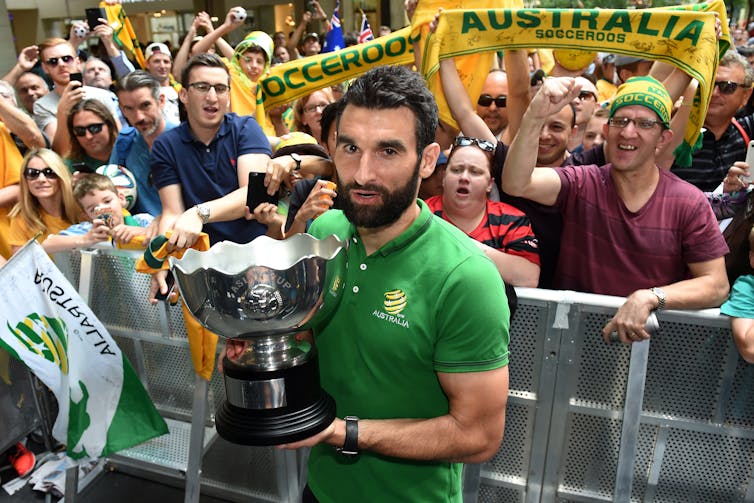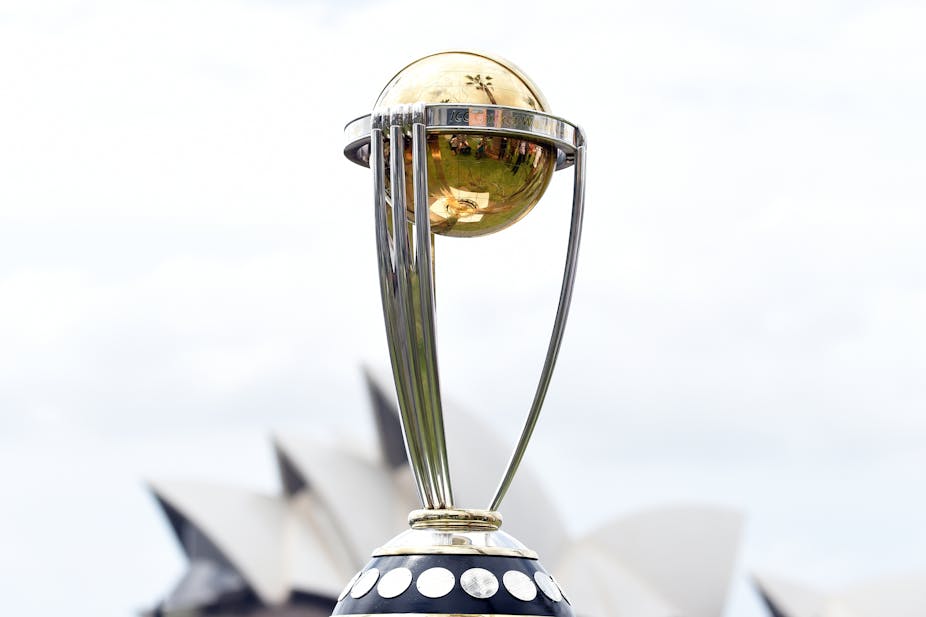The cricket World Cup’s opening game, which pits Australia against England on Valentine’s Day, is the latest twist in a summer in which Australia has played host to two of the world’s biggest sporting events. Football’s Asian Cup and cricket’s World Cup have brought representative teams of 27 sporting nations to these shores in pursuit of two elusive trophies.
The curious geography of international sport has meant that the only countries participating in both tournaments are Australia and the United Arab Emirates. Brisbane, Canberra, Melbourne and Sydney are the only Australian cities to stage both football and cricket games.
Apart from the surprising entertainment of the Australia Day knighting of Prince Philip and the ensuing political turmoil in the Liberal Party, sport has offered the summer’s most conspicuous contests. By the time the cricket World Cup final rolls around on the eve of Easter, matches will have been running ever since the pre-Christmas Test matches against India.
But what is the significance and value of these festivals of international sport? Are they worth the effort, cost and risk? Large quantities of public money are spent in securing and presenting them, including keen competition between the states for host rights “packages”.
International sport creates a massive carbon footprint that is hardly good news for planetary sustainability. As cultural researcher Toby Miller has noted, the 2010 World Cup in South Africa:
… had the largest carbon footprint of any commercial event in world history: 850,000 tonnes of carbon expended, 65% of it due to flights.
Few events in the world are more dependent on flying large numbers of people long distances than a major sports tournament in Australia.
There are also the familiar “bread and circuses” criticisms that sport distracts people from really important matters. If that sounds a little too puritanical, there is no doubt that “big sport” seriously disturbs the cultural and media ecology. Television and radio news program schedules are often changed and when the news can be accessed it’s likely to be led and dominated by the sport event that changed the schedule in the first place.
So, how convincing are the conventional justifications for hosting mega events? The most prominent case is economic and emphasises the benefits of sports-related activity, especially tourism. Tourism Australia described the Asian Cup as providing a “free kick” in generating 500,000 spectators (it was actually 650,000), including an estimated 30,000 from overseas.
More diffusely, the advantages of attracting the wandering eyes of the world to Australia are stressed through television viewing figures. This was estimated at more than a billion worldwide for the Asian Cup. A similar number is predicted for the cricket World Cup.
The economic benefits of hosting mega sporting events are notoriously inexact. The equally common claim that mega sport moments make for sustained higher levels of sport participation and improved health and fitness are also frequently discredited.
The stubborn lack of evidence connecting mega sporting events to real profits and blooming health leads their proponents into more nebulous territory – such as that they function as important sport diplomacy vehicles, especially as Australia turns towards and embraces Asia, from which 20 of the 27 teams in the two tournaments originate.
While sport may encourage goodwill between nations, it can also provide a focus for geopolitical tensions. There were rumblings from West Asia, on the eve of the Asian Cup final between Australia and South Korea, that the host nation should be expelled from the Asian Football Confederation for not being Asian enough. The irony would not have been lost on sport diplomacy advocates and sceptics alike.

More seriously, had Indonesia qualified for the Asian Cup, sport diplomacy would have been a very delicate matter as many people make stringent attempts to save Australians Andrew Chan and Myuran Sukumaran from the appalling prospect of a firing squad.
Sports events are characterised by assembling large numbers of people in confined spaces in a competitive atmosphere. While serious social disorder would have been unlikely, a “diplomatic incident” involving protest at the apparent determination of Indonesia to execute the two men would not.
In any event, the possibility of sport-related or facilitated political violence, and the enthusiasm of authorities for subjecting people attending or living near mega sporting venues to heavy-duty control and surveillance, has already inflicted some very undiplomatic indignities on them.
Despite – or perhaps because of – these concerns, the most reliable justification for hosting mega sports events is as boosters of national morale and collective identity. The vagaries of national team performance – as Brazil discovered to its deep shame in hosting the 2014 football World Cup – can put a dampener on pride in country. But it can have the reverse exhilarating effect, as many Australians found in winning the Asian Cup on home soil.
At the same time, event organisers have artfully harnessed the “old country” passions of diasporic sport fans in multicultural Australia.
Mega sporting events, in the final analysis, are exuberant and expensive parties. Not everyone wants to be invited to or attend them. But nobody could have ignored that across the summer, with its usual diet of the Australian Open tennis, cycling’s Tour Down Under, A-League football, domestic Twenty20 Big Bash and international tri-series one-day cricket, two very big travelling sport circuses swung by.
These mega events won’t be back for a while. But just as Australia’s summer of the sporting event recedes into history, it will already have merged seamlessly with the rugby and Australian rules football seasons. Too much sport, as the nation’s foremost sport philosophers have pithily proposed, is barely enough.

